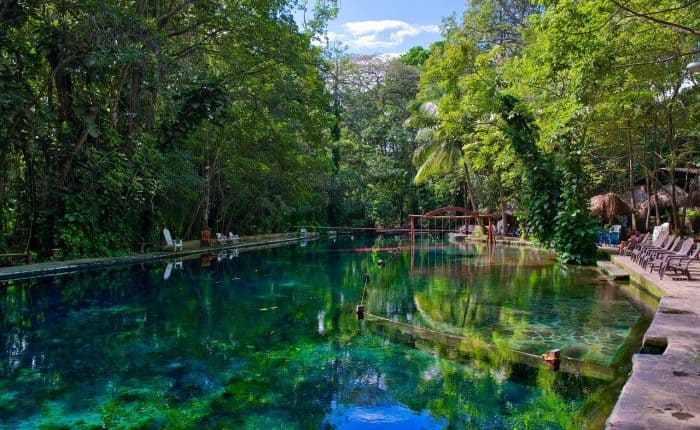Banking In Nicaragua
Many Americans are looking to get some of their money outside of the United States. This only makes sense. Diversity is the name of the game when it comes to financing, and banking is no different. Putting some of your money in a bank based in a foreign country is an excellent way to hedge against any kind of volatility that may arise in the United States banking sector.
American banks can be described as unstable, with extreme volatility immanent, or they can be described as very stable, depending on who you talk to. But with so many opinions being thrown around, it only makes sense to give a bit of extra preparation and add more security to your finances by opening a bank account in another country.
Residency
Most all banks in Nicaragua require that individuals become Nicaraguan residents to open bank accounts.
Some banks may allow individuals who are not residents to open accounts, but it is not something that one should count on.
Handpicked Related Content: Why Nicaragua Should Be Your Residency Destination
Benefits Of Banking In Nicaragua
Having a bank account in Nicaragua has many benefits.
In Case Of Emergency
As mentioned above, it is incredibly smart to get some of your money outside of the United States. No one can predict the future, and as such keeping all of your money in a single bank, in a single country is foolhardy, and only invites the possibility of calamity for yourself in the future.
You can even keep some of your money saved in the local currency or in euros to hedge against any volatility with the US dollar. Be aware, however, that the córdoba, Nicaragua’s unit of currency, has significantly higher inflation than the US dollar, and most foreigners with bank accounts in Nicaragua keep their money denominated in either US dollars or euros.
Reduction In Fees
Another major benefit of having a bank account in Nicaragua is the reduction in fees. If you plan on spending any considerable amount of time in Nicaragua, having a bank account here will save you a lot of money. The ATM fees for foreign banks are pretty steep, around $8 every time you go to take out money. They can be even higher, especially if you are taking out money in the local currency.
Speaking of that – DON’T EVER DO IT. In addition to not withdrawing money in córdobas, don’t ever exchange your US dollars for córdobas. It is nothing more than a waste of money. With the possible exception of street merchants, every single business in Nicaragua accepts American dollars.
And, they will give you your change in córdobas (unless you specifically ask for a change in dollars), allowing you to exchange your money for the local currency without any pesky, and pricey, exchange fees. In case you were wondering, the current exchange rate for US dollars and córdobas is 34.85 córdobas for every 1 US dollar.
Banking In Nicaragua Has Higher Interest Rates
One of the worst parts of banking in the United States is the interest rates. Most bank accounts in the United States don’t earn even a full 1% interest annually. While it is better than stuffing your money under a mattress, it’s just barely better.
Experience the Insider community that takes your international lifestyle to the next level. Download your FREE guide
"18 Steps to Implementing Your Plan B" instantly!
Luckily for you, banks in Nicaragua pay very attractive interest rates even on basic savings accounts. For savings accounts with large balances, interest earned can be as high as 6%.
Your Banking Options In Nicaragua
Nicaragua has several major banks that operate within its borders. Most of these banks offer both checking and savings accounts. They can issue you checkbooks, as well as debit and/or credit cards. Your money can be denominated in córdobas, US dollars, or euros. Most offer online and over the phone services, such as for paying bills, transferring funds, and checking account transactions.
Handpicked Related Content: How To Settle Down In Nicaragua As An Expat
BAC
Banco de America Central (BAC) is a modern bank and as such allows customers to manage their accounts via email and by phone. They have many branches and ATM locations (70 in total throughout the country), so getting money out of a BAC account should never be a problem. You can even pay bills electronically through BAC.
One of the greatest benefits of banking with BAC is that in addition to having a Nicaraguan bank account, BAC will also allow you to open up a Panamanian bank account. Again, this adds to greater diversification and security of your money. The minimum balance for a checking account with BAC is $500 and for a savings account, it is $200.
BDF
Banco de Finanzas (BDF) is another popular and reputable bank in Nicaragua. They allow customers to open both checking and savings accounts, obtain checkbooks, debit, or credit cards. They have many branches and ATM locations within the country. They also offer online services, such as transferring money between accounts, checking account transactions, and paying bills.
The minimum to open a checking account is either $100 or $500, depending on the type of checking account. An interest-earning savings account can be opened, with a minimum balance of $50, and a $5 fee for not meeting this minimum. Funds can be transferred to/from a BDF account to/from any bank with an office or branch in the US. The fee for this is 0.5% commission and a fixed fee of $45.
BANPRO
Banco de la Producción (BANPRO) is another prominent Nicaraguan bank. They offer credit/debit cards, checkbooks, and online bill pay services. The minimum deposit to open a checking count with BANPRO is $500. This is also the minimum monthly balance. If it is not met, a $15 fee is incurred.
An interest-earning savings account can also be started, with a minimum initial and monthly balance of $100. A $5 fee is incurred if this is not met. BANPRO allows non-resident foreigners to open savings accounts, which is good news for those looking to keep some money in Nicaragua but who are not Nicaraguan residents.
BANCENTRO
Banco de Credito Centroamericano (BANCENTRO) offers many of the same services other Nicaraguan banks do, such as credit/debit cards. You can do online bill pay through BANCENTRO. One unique feature of BANCENTRO is its Autobanco branch, which allows customers to make banking transactions from within their car.
To open a savings account with BANCENTRO requires a minimum deposit of $50, but a minimum of $200 is required if you want to earn interest on your savings account. BANCENTRO is an excellent option for those who plan to transfer money in large amounts or those who plan to do so frequently.
BANCENTRO uses an intra-banking communication network known as SWIFT, which allows BANCENTRO customers to do such things as sending and receiving credit letters, as well as to make international transfers, in any currency, to anywhere in the world.
Handpicked Related Content: Why Nicaragua Is The Best Place To Invest In Teak
Don’t Forget FATCA… It Certainly Won’t Forget You
Unfortunately, access to many of these banks is being curtailed for American citizens due to FATCA. If you are not aware of what FATCA is, here is a brief summary.
The Foreign Account Tax Compliance Act (FATCA) is a law passed in 2010 regarding the taxation of foreign assets of American citizens. Essentially, it allows the United States government to tax its citizens on all income earned and all assets owned, regardless of where that income was earned or where those assets lie. It is taxation based on citizenship, as opposed to taxation based on residency.
The United States is unique in its approach to taxation in this way. Almost all other countries in the world tax their citizens based on their residency, meaning that if you are a Canadian citizen but live and earn income in New Zealand, you will not pay Canadian taxes on that income. If you are an American citizen living and earning an income in New Zealand, however, you will pay American taxes on that income.
FATCA requires that foreign banks must report all American income and financial assets to the IRS. What this means for those banks is that it is significantly more expensive now to do business with American citizens, and as a result, many foreign banks will make it extremely difficult for Americans to open accounts with them, or even flat out deny Americans the ability to open accounts, simply based on their citizenship.
While many foreign banks will deny or discourage Americans from opening accounts with them, the good news is that some still do. In Nicaragua, for example, BAC has stated that, despite the increased costs to them due to FATCA, they will still do business with American citizens. While it is possible to open accounts with other banks in Nicaragua, be aware that, due to FATCA and your American citizenship, you might run into difficulties when attempting to open an account.
Conclusion
There are many benefits to opening up a bank account in Nicaragua.
You may be a foreigner who is looking to get some of their money housed outside of the United States. Or you may be a foreigner or foreign-resident who spends a considerable amount of time and money in Nicaragua and is looking to ease the costs and time associated with managing your money while in Nicaragua.
Whatever the case, opening a bank account in Nicaragua can open many doors for you. It can save you a lot of hassle, and add much-needed diversity and protection to your finances.
Here is probably the most extensive ebook on Everything You Ever Wanted To Know About Eliminating Your Taxes, Protecting Your Assets And Regaining Privacy Over Your Life And Investments. It is called The Ultimate Guide To Going Offshore.
I hope you enjoyed reading this article: Banking In Nicaragua.
Is leaving your home country for a new country a priority of yours? Do you wish you knew how, but don’t? Then here is a great article for you to read. It can help you understand a little bit about Citizenship-By-Investment programs around the world. For more information on the CBI programs, please contact our office HERE.
 Michael K. Cobb is the CEO and co-founder of ECI Developments which has properties throughout Latin America. He speaks all over the world on international real estate and is a board member of the National Association of Realtors.
Michael K. Cobb is the CEO and co-founder of ECI Developments which has properties throughout Latin America. He speaks all over the world on international real estate and is a board member of the National Association of Realtors.
Like Our Articles?
Then make sure to check out our Bookstore... we have titles packed full of premium offshore intel. Instant Download - Print off for your private library before the government demands we take these down!







